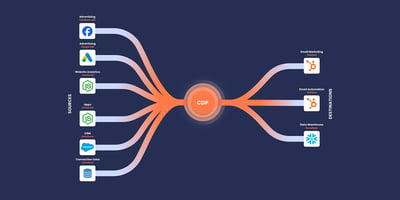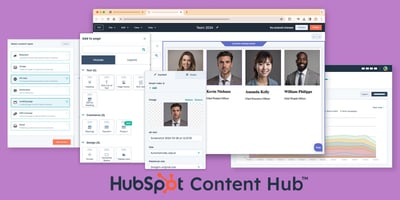As Salespeople, we collect data about and from our customers and prospects daily. Increased legislation and regulations and the evolution of sales have led to changes in how this data is stored, collected and used in the sales process.
We're HubSpot fans, so we'll refer to HubSpot below, but any good CRM will handle the process well.
Collecting better information for sales
Delighting and understanding the client's needs
Knowing the who, what, why and when of your prospects as they journey through your sales process is a key element in selling better. Having the right data can give you insight into:
- Who is involved in buying your product/service
- What is it that led to them being interested
- Why did they choose you over a competitor
- When in the buying process they are likely to buy or,
- When will they be likely to buy again
Understanding the fundamentals of which data is valuable and which is not can be a deciding factor in making more sales. The more we know about our prospects the easier it is for us to find common pain points and see patterns about who is buying from us. This not only aids us in selling to new customers but makes repeat sales more likely.
Speeding up the deal
How often do sales get held up over simple administrative tasks that then lengthen deal cycles exponentially? Collecting information such as billing cycles, teams responsible for signing off and the organagram of a prospect company can help speed up deals. This is easily achieved through creating personas or charting the organisation out early in the sales process. While these may seem like chores to some salespeople may save them days or months in the sales process.

Easing handover to nurturing and support teams
The aforementioned data collection not only benefits the sales process but also helps build cohesion between the sales team and other departments. Account managers have more information about the company they are working with, and finance and billing teams will know when and how to invoice. Small inputs in the sales process lead to happy clients because there is less friction for them, as well as happy internal departments.
How to keep sales data clean
Make sure the correct information is collected at the beginning
Let's face it, most salespeople are looking for the quickest way to collect the required information and often skip some collection processes to save time. If the deal never progresses then the data sits in a system for some time until there is a mass clean-out. Make sure that whenever data is collected there are minimum criteria that are required before a prospect (company or contact) can be added to your system. By being strict in this process it is going to be easier to maintain a usable data set.
These are often business-specific and will need to be thought about when you are setting up your system. Look at the type of information most commonly slows a deal down in the closing stages, is there a reason that wasn’t collected upfront? Talk to other departments to find out what pain points they have with sales handovers, and make sure that there is a process in place to recycle or automatically delete data that is no longer valid.
Checks to identify incorrect data
It is considered best practice to set up a dashboard or some kind of view of information that shows which key data is missing from the data. Some examples of this include;
- A name that is missing
- Company revenue may be missing
- Email or contact data could be omitted
These are things that an organisation will need to decide internally but it is always a good backup to have to ensure that nothing slips through the cracks.
Using external tools to cleanse the data
There are systems out there that can be plugged into a CRM system these days that cleanse existing data. It may be worth looking into these if your business stores information over a long period.
Using HubSpot for sales data
Importing data
HubSpot makes it easy to collect information about your prospects. If you have an existing list, there is a bulk import. If you would like to segment them based on a set of criteria or know the source which created the information you can easily do this. Connecting your social media accounts and website also benefits you to know where the ROI is coming from.
If you are an on-the-ground salesperson then you can even scan business cards through the HubSpot app.
Required fields
The basic criteria that need to be collected can be changed and modified to fit your business. This means that you can go above and beyond the basic name, surname and email address and collect smarter data at the offset. Custom property objects can be created if you have a niche that needs to be collected or calculated.
Permission sets for internal data compliance
Not everyone in most organisations needs to see sensitive client information. These permissions can be changed for both teams or individuals within HubSpot. They can be set up for various teams or personnel, meaning that only the need-to-know data is seen when it needs to be.
Using data in personalised campaigns
Personalisation is a big topic online for sales outreach these days. Changing a name and a sign-off no longer cut it. You can add personalised messaging into many areas of your HubSpot portal to assist salespeople. Here are a few:
- Templated emails
- Sequences
- Playbooks
These enable your sales team to do less admin while still keeping things personal with their prospects.
Required fields for Pipelines stages
Deals usually require more data input as they progress. The initial stages may just be conversational and light and as the deal gets closer to over the line there is a greater need for more detailed data.
HubSpot’s deal pipelines can be created in such a way that the information needed for a deal to reach a certain stage is collected at that stage.
This reduces the chance of missing or incorrect data further down the sales pipeline when it matters most. The playbooks tool can be utilised during the discovery and later stages to guide or remind salespeople what they need to collect by ensuring they have answered specific questions. This keeps them accountable and responsible for the right data being collected.
The importance of a robust and secure CRM
Data Privacy
Gone are the days when a salesperson needed a phone and a strong network of client numbers stored in a Rolodex. In sales, we use several methods to obtain client information and data privacy laws that are often overlooked. Storing client information securely is a necessity. This is where a robust CRM system like HubSpot comes in. Salespeople can collect valuable data on their prospects and data security teams can rest easy knowing that it is stored securely.
This is not only an external problem and sometimes internal teams need to limit access to certain information that may be sensitive to a specific business unit. If you would like a more detailed look at data privacy, take a look at “Data Privacy for Email Nurturing and Automation”.
The importance of clean data
These days, with all the data tools out there (Apollo, Zoom info, crunch base etc) sales teams can collect vast amounts of data at the click of a button. While this is valuable, in many cases in a matter of a few weeks this data is no longer applicable. Some factors that influence the erosion of data are:
- Prospects changing jobs
- Unreliable sources of information
- Data tools guessing data based on old information
- The dependability on social media systems such as LinkedIn
Keeping this data up to date, and relevant and storing it securely are vital to success in the sales environment.
Final word
Having accurate data in sales is of the utmost importance, especially in today’s times. Utilising tools to gather data is helpful, but having a robust system alongside an adequate data collection process is imperative. Storing bulk information in your CRM is no longer necessary and HubSpot is here to help you keep your data safe and clean.





